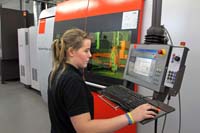13 January 2016
CO2 laser cutting time reduced with Bystronic fibre machine
 At the Witton, Birmingham factory of Wheeler Fabrications, a 3 kW fibre laser cutting machine from Bystronic UK has taken over from an older, second-hand CO2 laser, dramatically raising productivity and product consistency as well as allowing the subcontractor to reduce both lead-times and costs to customers.
At the Witton, Birmingham factory of Wheeler Fabrications, a 3 kW fibre laser cutting machine from Bystronic UK has taken over from an older, second-hand CO2 laser, dramatically raising productivity and product consistency as well as allowing the subcontractor to reduce both lead-times and costs to customers.
When the company was visited in November 2015, a job on the 3 kW Bystronic BySprint Fiber 3015 was completed in under six hours. It involved producing 125 units from 1.5 mm and 3 mm stainless steel sheet for oil rig safety lights. Production manager Mark Ashford, who started with the company 20 years ago as an apprentice, said that the contract would have taken four days to finish on the previous CO2 laser, which in any case would have struggled to cut the thicker material.
Mr Ashford said, “Eighty per cent of our work here involves sheet between 1 mm and 3 mm thick, which is ideal for extracting maximum benefit from fibre laser cutting.
“The BySprint Fiber machine, due to a combination of its technology and the high power of the laser, is five times faster at profiling components than the machine that it replaced.
“It is also significantly less expensive to run, as it pulls less power and does not require costly servicing of optics. Neither do we have to buy bottles of helium or CO2 resonator gas any more.
“It means that we can manufacture more economically, allowing us to pass on cost reductions to our customers and at the same time maintain profitability.”
He explained that another advantage of fibre laser cutting is its ability to machine reflective materials, as there are no optics to become damaged. Copper, brass, aluminium and stainless steel sheet up to 3 metres by 1.5 metres in various thicknesses from 0.5 mm to 6 mm are processed without difficulty. “They all cut like a dream”, Mr Ashford enthused.
Established 35 years ago by owner Bryan Wheeler as a factory maintenance firm serving large companies in the area such as Dunlop and Smith & Nephew, Wheeler Fabrications gradually moved into sheet metal working. Towards the end of the 1990s, the company installed a turret punch press that is still in operation and an Edwards Pearson press brake (now part of Bystronic). A move from a nearby unit into its present premises in 2013 trebled the floor area available for production and provided additional space for installation of the Bysprint Fiber 3015 and other plant.
Today, the highly skilled team at the company provides a broad range of industries with design consultancy followed by comprehensive metal cutting, folding and fabrication services, from prototyping through low volume runs to production quantities. The petrochemical, defence, automotive, food, hygiene, shopfitting, lighting and furniture sectors are among those served. Four-fifths of sheet metal output is folded, indicating that the firm is very much at the high value end of the business.
Mr Ashford continued, “We spent 18 months researching the market and comparing different fibre laser cutting machines.
“Several potential suppliers were given a trial to produce a difficult component. Bystronic gave the best response from its technical centre in Coventry and the company has continued to provide good applications support.
“Another point in the Swiss manufacturer’s favour was the seamless interaction of the company’s Bysoft 7 nesting and 2D programming software not only with its own machine control but also with our Radan 3D modelling CAD/CAM software.
“Bysoft has an integral seat of SolidWorks CAD, so we could also design components in that environment if we chose to.”
An increasing number of Wheeler Fabrication’s customers are opting for components to be made out of pre-plated materials, as the finishing services it buys in are becoming more and more expensive. Partly with minimising damage to these materials in mind, and also to avoid the arduous job of physically handling sheets onto the Bystronic machine, the BySprint Fiber machine was supplied with a ByLoader 3015.
At the press of a button, it loads a new sheet onto the machine’s shuttle table after the operator has removed the previously cut components and skeleton. The subcontractor often produces 15 jobs from 15 different materials in a day, so efficient handling is important.
Since the fibre laser cutting machine was installed, it has resulted in the subcontractor winning a lot of new business. A 1.5 metre long, 6 mm thick brass grille has just been produced for Birmingham Repertory Theatre, a job that would have been impossible on the CO2 laser.
Another recently completed contract that would previously have been uneconomical due to the slowness of the old laser machine was the production of 1,200 electrical cabinets from 1.2 mm thick Zintec in three variants for the construction industry.
- Contact Information
- Name: David Larcombe
- Email: david.larcombe@bystronic.com
- Website: www.bystronic.com

